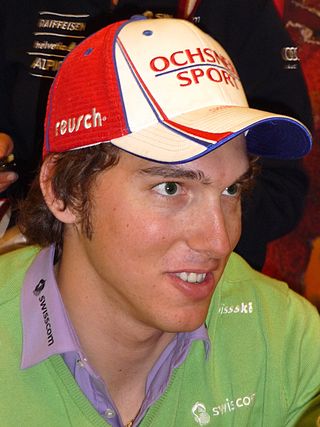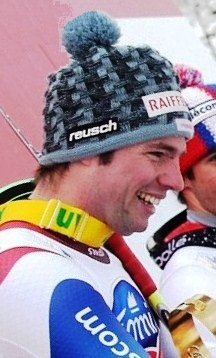This article includes a list of references, related reading, or external links, but its sources remain unclear because it lacks inline citations .(March 2020) |
| 1980 Men's Downhill World Cup | |
| Previous: 1979 | Next: 1981 |
Men's downhill World Cup 1979/1980
This article includes a list of references, related reading, or external links, but its sources remain unclear because it lacks inline citations .(March 2020) |
| 1980 Men's Downhill World Cup | |
| Previous: 1979 | Next: 1981 |
Men's downhill World Cup 1979/1980
In men's downhill World Cup 1979/80 the best 5 results count. Seven racers had a point deduction, which are given in ().
| Alpine skiing World Cup | |
| Men | |
| 1980 |

The FIS Alpine Ski World Cup is the top international circuit of alpine skiing competitions, launched in 1966 by a group of ski racing friends and experts which included French journalist Serge Lang and the alpine ski team directors from France and the USA. It was soon backed by International Ski Federation president Marc Hodler during the FIS Alpine World Ski Championships 1966 at Portillo, Chile, and became an official FIS event in the spring of 1967 after the FIS Congress at Beirut, Lebanon.

Downhill is a form of alpine skiing competition. Whereas the other alpine skiing events emphasize turning and technique, downhill emphasizes "the six components of technique, courage, speed, risk, physical condition and judgement", according to the FIS "International Ski Competition Rules (ICR)". Speeds of up to 130 km/h (81 mph) are common in international competition. Athletes must have an aerodynamically efficient tuck position to minimize drag and increase speed.

Super giant slalom, or super-G, is a racing discipline of alpine skiing. Along with the faster downhill, it is regarded as a "speed" event, in contrast to the technical events giant slalom and slalom. It debuted as an official World Cup event during the 1983 season and was added to the official schedule of the World Championships in 1987 and the Winter Olympics in 1988.

Kenneth John Read is one of the most respected sports leaders in Canada. This World Cup alpine ski racer from Canada was a specialist in the downhill and a two-time Olympian. He won five World Cup races during his ten-year international career, all in downhill.
Combined is an event in alpine ski racing. The event format has changed within the last 30 years. A traditional combined competition is a two-day event consisting of one run of downhill and two runs of slalom; each discipline takes place on a separate day. The winner is the skier with the fastest aggregate time. Until the 1990s, a complicated point system was used to determine placings in the combined event. Since then, a modified version, called either a "super combined" or an "Alpine combined", has been run as an aggregate time event consisting of two runs: first, a one-run speed event and then only one run of slalom, with both portions held on the same day.
The 39th World Cup season began in October 2004 in Sölden, Austria, and concluded in March 2005 at the World Cup finals in Lenzerheide, Switzerland. The overall winners were Bode Miller of the U.S. and Anja Pärson of Sweden.
The 38th World Cup season began in October 2003 in Sölden, Austria, and concluded at the World Cup finals in Sestriere, Italy, in March 2004. Sestriere would host the alpine skiing events at the 2006 Winter Olympics.
The 21st World Cup season began in August 1986 in Argentina for men, resumed in late November, and concluded in March 1987 in Sarajevo. The overall champions were Pirmin Zurbriggen and Maria Walliser, both of Switzerland, who each won for the second time. Two-time women's overall World Cup champion Erika Hess of Switzerland retired at the end of the season.
The 14th World Cup season began in December 1979 in France and concluded in March 1980 in Austria.
The 13th World Cup season began in December 1978 in Austria and concluded in March 1979 in Japan.

Peter Müller is a former World Cup alpine ski racer from Switzerland.

Birds of Prey is a World Cup downhill ski course in the western United States, located at Beaver Creek Resort in Avon, Colorado. The race course made its World Cup debut 26 years ago in December 1997.

The 44th World Cup season began on 24 October 2009, in Sölden, Austria, and concluded on 14 March 2010, at the World Cup finals in Garmisch, Germany.
Men's downhill World Cup 1978/1979

The 48th World Cup season began on 26 October 2013, in Sölden, Austria, and concluded on 16 March 2014 at the World Cup finals in Lenzerheide, Switzerland. The defending overall champions from the 2013 season were Marcel Hirscher of Austria and Tina Maze of Slovenia. The overall titles were won by Hirscher and Anna Fenninger, also of Austria. The season was interrupted by the 2014 Winter Olympics that took place from 7 to 23 February in Sochi, Russia, with the alpine events at Rosa Khutor.

The 49th World Cup season began on 25 October 2014, in Sölden, Austria, and concluded on 22 March 2015 at the World Cup finals in Meribel, France. The defending overall champions from the 2014 season - Marcel Hirscher and Anna Fenninger, both of Austria, defended their titles successfully. The season was interrupted by the World Championships in February, in the United States at Vail/Beaver Creek, Colorado. Combined events were not awarded as a discipline trophy.

The Men's Downhill competition of the 1980 Winter Olympics at Lake Placid was held at Whiteface Mountain on Thursday, February 14.

The men's downhill in the 2021 FIS Alpine Skiing World Cup consisted of seven events. The original schedule had contained nine downhills, but a rescheduled one on 5 March in Saalbach-Hinterglemm, Austria, was canceled due to fog and continual snowfall after just nine skiers had finished, and the downhill during World Cup finals week was also canceled.